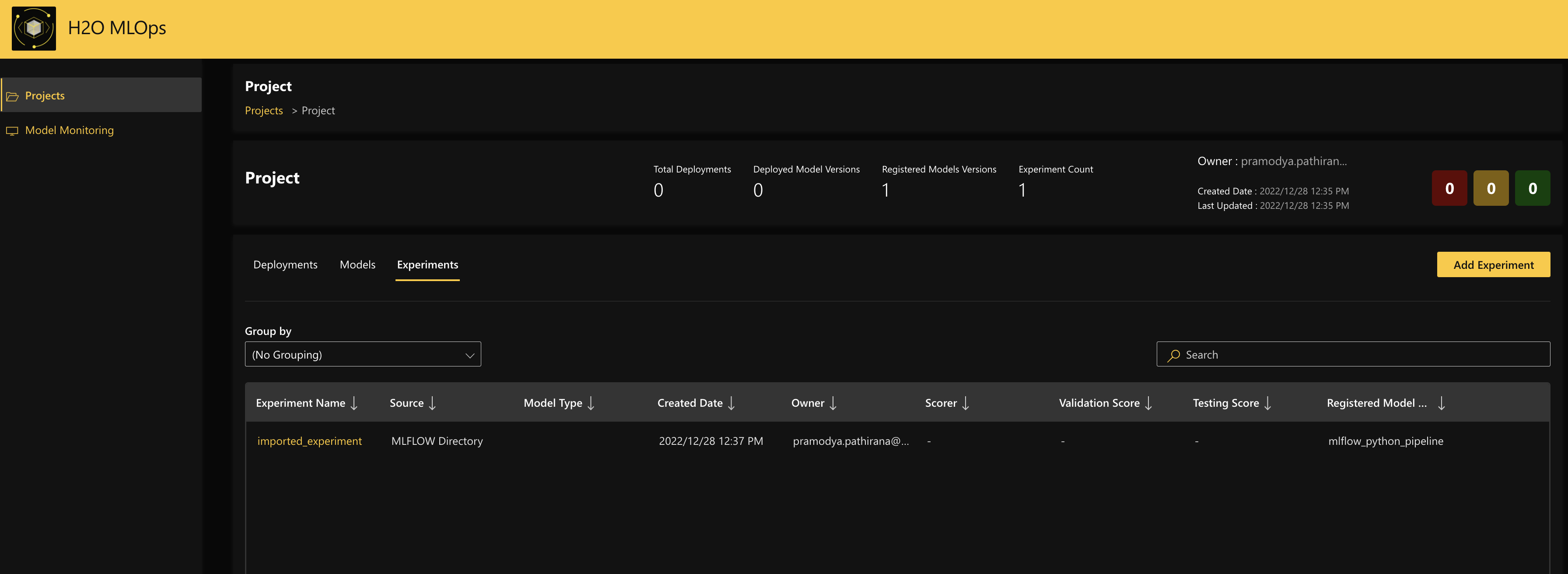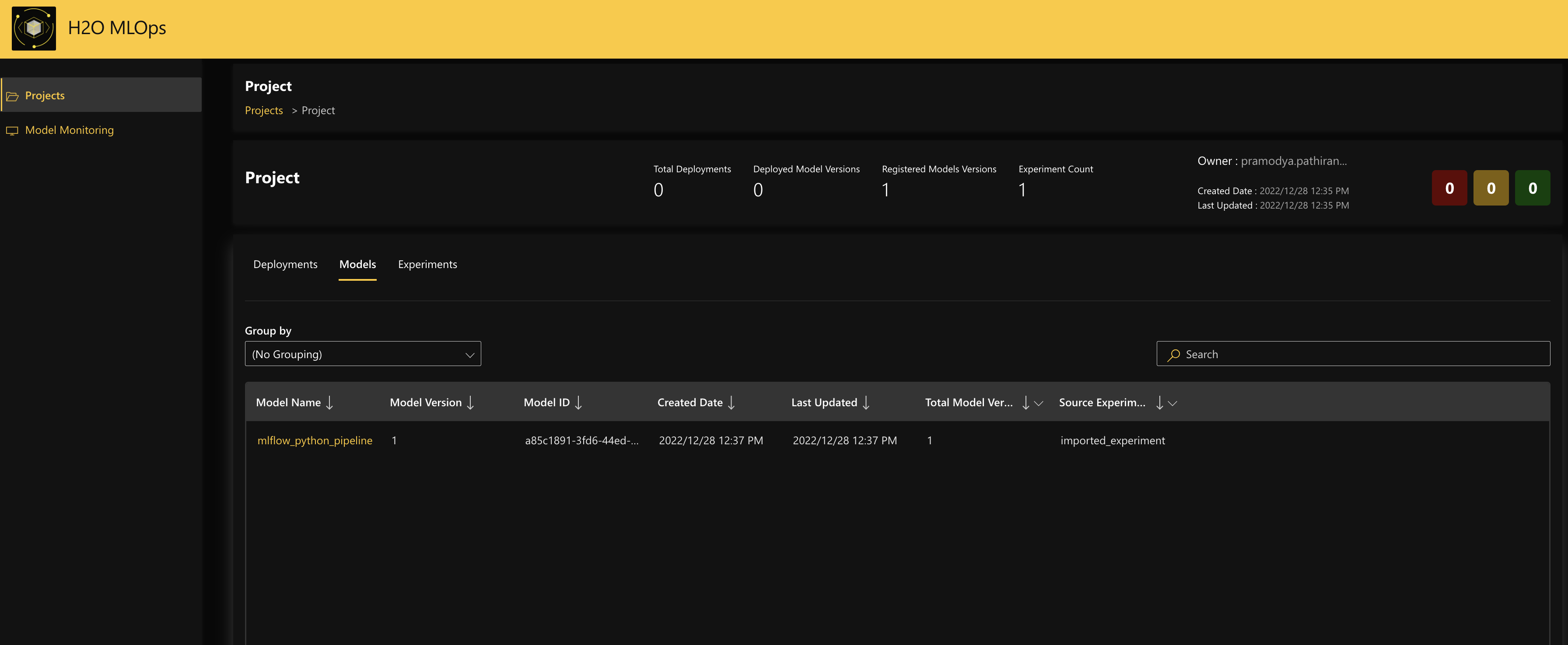Add external registry model to MLOps
This example demonstrates how you can use the MLOps Python client to add experiments from an external model registry to MLOps using the ExternalRegisteredModelVersionService of the MLOps API.
- Ensure that the external model registry is configured.
- You will need the values for the following constants in order to successfully carry out the task. Contact your administrator to obtain deployment specific values.
| Constant | Value | Description |
|---|---|---|
MLOPS_API_URL | Usually: https://api.mlops.my.domain | Defines the URL for the MLOps Gateway component. |
TOKEN_ENDPOINT_URL | https://mlops.keycloak.domain/auth/realms/[fill-in-realm-name]/protocol/openid-connect/token | Defines the token endpoint URL of the Identity Provider. This uses Keycloak as the Identity Provider. Keycloak Realm should be provided. |
REFRESH_TOKEN | <your-refresh-token> | Defines the user's refresh token. |
CLIENT_ID | <your-client-id> | Sets the client id for authentication. This is the client you will be using to connect to MLOps. |
CLIENT_SECRET | <your-client-secret> | Sets the client secret. |
PROJECT_NAME | <project-name> | Provide the project name in MLOps to which the model will be imported. |
EXTERNAL_REGISTERED_MODEL_NAME | <model-name> | Provide the registered model name in the external model registry to import from. |
EXTERNAL_REGISTERED_MODEL_VERSIONS | eg: ["1", "2", "3"] | Provide the versions of the EXTERNAL_REGISTERED_MODEL_NAME to import. This allows importing up to five versions. Version numbers should be provided as an array. |
The following steps demonstrate how you can use the MLOps Python client to add experiments from an external model registry to MLOps.
Change the values of the following constants in your
AddExternalRegistryModelToMLOps.pyfile as given in the preceding data table.AddExternalRegistryModelToMLOps.py### Constants
MLOPS_API_URL = "https://api.mlops.my.domain"
TOKEN_ENDPOINT_URL="https://mlops.keycloak.domain/auth/realms/[fill-in-realm-name]/protocol/openid-connect/token"
REFRESH_TOKEN="<your-refresh-token>"
CLIENT_ID="<your-mlops-client>"
CLIENT_SECRET = "<your-client-secret>"
PROJECT_NAME = "<project-name>"
EXTERNAL_REGISTERED_MODEL_NAME = "<model-name>"
EXTERNAL_REGISTERED_MODEL_VERSIONS = ["1", "2", "3"]Run the
AddExternalRegistryModelToMLOps.pyfile.python3 AddExternalRegistryModelToMLOps.pyThis adds the experiments for the list of model versions represented by the request.
{
"responses" : [ {
"description" : "description",
"experimentId" : "experimentId",
"status" : "status"
}, {
"description" : "description",
"experimentId" : "experimentId",
"status" : "status"
} ]
}Navigate to your project in MLOps and click the Experiments tab to view the experiments imported from the external model registry. This example uses MLflow as the external model registry.

Click the Models tab to view the imported model. It is now registered with the MLOps model registry. If the imported model was another version of an existing model, then the new version is added.

Example walkthrough
This section provides a walkthrough of the AddExternalRegistryModelToMLOps.py file.
Get the list of projects in MLOps and check if the given
PROJECT_NAMEexists.AddExternalRegistryModelToMLOps.pydef _get_project_id(projects: List[mlops.StorageProject]) -> str:
"""Gets the ID of the selected project."""
for p in projects:
if p.display_name == PROJECT_NAME:
return p
else:
raise LookupError("Requested project not found")Prepare the request required by the
_list_all_versions_for_modelfunction.AddExternalRegistryModelToMLOps.pydef _form_list_model_version_request(model_name:str):
return mlops.ModelregistryListRegisteredModelVersionsForModelRequest(
source_key=model_name
)Prepare the request required by the
_import_external_model_into_mlopsfunction.AddExternalRegistryModelToMLOps.pydef _form_import_model_version_request(project_id: str, registered_model_name: str, registered_model_versions: List[str]):
external_registered_model_versions = [
mlops.ModelregistryExternalRegisteredModelVersion(
source_key=registered_model_name, version=version
)
for version in registered_model_versions
]
return mlops.ModelregistryImportRegisteredModelVersionRequest(
external_registered_model_versions=external_registered_model_versions,
project_id=project_id,
)
Prepare the request required by the
_add_experiments_to_mlopsfunction.AddExternalRegistryModelToMLOps.pydef _form_add_experiments_request(versions: List[mlops.ModelregistryExternalRegisteredModelVersion]):
return [
mlops.ModelregistryAddExperimentRequest(
model_version_id=version.adapter_model_version_id,
experiment_name="imported_experiment",
)
for version in versions
]Create a new project in MLOps if a project by the given name does not exist.
AddExternalRegistryModelToMLOps.pydef _create_project(mlops_client: mlops.Client):
return mlops_client.storage.project.create_project(
mlops.StorageCreateProjectRequest(
mlops.StorageProject(display_name=PROJECT_NAME)
)
).projectList the model versions for the given registered model by calling the
ListRegisteredModelVersionsForModelendpoint of theExternalRegisteredModelVersionService.AddExternalRegistryModelToMLOps.pydef _list_all_versions_for_model(
mlops_client: mlops.Client, model_name: str
):
return mlops_client.external_registry.external_registered_model_version_service.list_registered_model_versions_for_model(
_form_list_model_version_request(model_name)
)Import the given model versions into MLOps by using the
ImportRegisteredModelendpoint of theExternalRegisteredModelVersionService.AddExternalRegistryModelToMLOps.pydef _import_external_model_into_mlops(
mlops_client: mlops.Client, project_id: str, registered_model_name: str, registered_model_versions: List[str]
):
try:
response = mlops_client.external_registry.external_registered_model_version_service.import_registered_model(
_form_import_model_version_request(project_id, registered_model_name, registered_model_versions)
)
return response
except Exception:
raiseAdd the experiments to MLOps by calling the
BatchAddExperimentsendpoint of theExternalRegisteredModelVersionService.AddExternalRegistryModelToMLOps.pydef _add_experiments_to_mlops(
mlops_client: mlops.Client, versions: mlops.ModelregistryImportRegisteredModelVersionResponse
):
try:
response = mlops_client.external_registry.external_registered_model_version_service.batch_add_experiments(
mlops.ModelregistryAddExperimentsRequest(
_form_add_experiments_request(versions)
)
)
return response
except Exception:
raiseIn the main function, set up the token provider using an existing refresh token and client secret, and then set up the MLOps client.
Call the
_get_project_idfunction to get the id of the given project name if a project by that name exists in MLOps. If not, call the_create_projectfunction to create a new project with that name.AddExternalRegistryModelToMLOps.pyprj: mlops.StorageProject
projects: mlops.StorageListProjectsResponse = mlops_client.storage.project.list_projects(
mlops.StorageListProjectsRequest()
)
try:
prj = _get_project_id(projects.project)
except LookupError:
prj = _create_project(mlops_client)Call the
_import_external_model_into_mlopsfunction with the project id,EXTERNAL_REGISTERED_MODEL_NAMEandEXTERNAL_REGISTERED_MODEL_VERSIONSto import the registered model versions from the external model registry. Then call the_add_experiments_to_mlopsfunction with the imported versions.AddExternalRegistryModelToMLOps.pytry:
import_response = _import_external_model_into_mlops(mlops_client, prj.id, EXTERNAL_REGISTERED_MODEL_NAME, EXTERNAL_REGISTERED_MODEL_VERSIONS)
imported_versions = import_response.external_registered_model_versions.copy()
for version in import_response.external_registered_model_versions:
if version.status == "IMPORTED":
print(version.source_key + " " + "Version:" +version.version +"--"+ version.status_description)
imported_versions.remove(version)
elif version.status_description:
print(version.source_key + " " + "Version:" + version.version + "--" + version.status_description)
imported_versions.remove(version)
if len(imported_versions) > 0:
add_experiment_response = _add_experiments_to_mlops(mlops_client, imported_versions)
print(add_experiment_response)
else:
print("No experiments available to add")
except Exception:
raise
- Submit and view feedback for this page
- Send feedback about H2O MLOps to cloud-feedback@h2o.ai